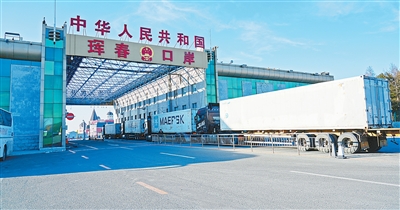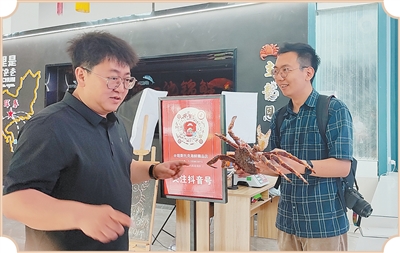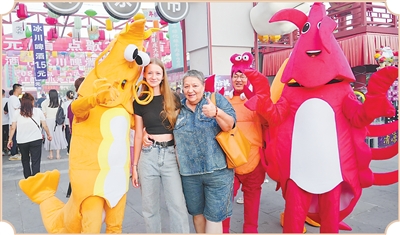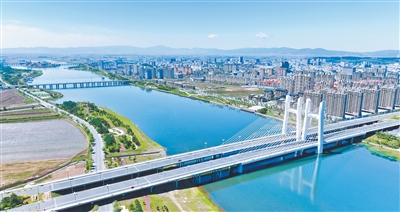




- BRNN
- BRI News
- BRNN News
- Database
Official Documents Polices and Regulations
Inter-government Documents International Cooperation BRI Countries
Business Guide Economic Data BRI Data
Trade
Investment Projects Latest projects
Cases - Content Pool

Trucks wait for inspection and release at Hunchun Port in Hunchun city, Yanbian Korean Autonomous Prefecture, northeast China's Jilin Province. (Photo/Lang Peng)
Hunchun city, located in Yanbian Korean Autonomous Prefecture, northeast China's Jilin Province, is where China, the Democratic People's Republic of Korea (DPRK), and Russia meet by land, and where waterways connect China, the DPRK, Russia, South Korea, and Japan. It is known as the "crossroads of Northeast Asia." This border city welcomes more cross-border travelers each year than the number of people who live there.
Traditional Chinese medicine gains popularity in Hunchun
At a moxibustion clinic in Hunchun, traditional Chinese medicine (TCM) practitioner Han Shiming feels a patient's pulse while asking about her condition. Sitting across from him is a Russian woman named Galiya. The waiting area outside the moxibustion room is full of Russian patients.
Han has practiced medicine for 30 years and is a prefecture-level inheritor of Manchu moxibustion therapy, an intangible cultural heritage. So far, tens of thousands of foreign patients have experienced Manchu moxibustion in Hunchun, most of them Russians, with a growing number from South Korea and Japan.

Russian tourists learn to make spicy pickled cabbage, a specialty delicacy in Hunchun city, Yanbian Korean Autonomous Prefecture, northeast China's Jilin Province. (Photo/Lang Peng)
"I was so nervous the first time I saw a foreign patient," Han recalled, describing his first Russian case at the beginning of 2000. "We didn't share a language. He had to gesture everything, and I did my best to treat him," said Han.
As China-Russia ties deepen and TCM becomes more widely known, Han now treats over 20 Russian patients a day during peak times. The clinic is permanently staffed with Russian-speaking interpreters. Russia has a cold climate, and many people there struggle with internal cold and dampness, Han explained, adding that moxibustion is especially effective for that. The clinic has even modified its moxa sticks to better meet the needs of Russian patients.
Word has spread. Russian visitors now come not just from nearby Vladivostok, but from Moscow, Sochi, and beyond. Some have even studied under Han and opened moxibustion clinics back in Russia.

Han Shiming (right) takes the pulse of a Russian patient named Galiya at his clinic in Hunchun city, Yanbian Korean Autonomous Prefecture, northeast China's Jilin Province. (People's Daily Online/Men Jiewei)
Han's experience reflects the growing demand for cross-border medical services in Hunchun. In recent years, more Russians have come to the city for TCM treatment. To better serve them, a TCM hospital in Hunchun has set up an international department, with interpreters on hand to provide one-stop service.
Russian king crabs sell well in Hunchun
In the king crab exhibition hall at the Hunchun Northeast Asia Cross-Border E-Commerce Industrial Park, a staff member sells Russia king crabs in front of the camera. The staff member swiftly pulls a giant Russian king crab from a tank, grips the crab, packs it into a box, adds ice and oxygen, and packs it—all in one smooth motion.

A People's Daily reporter (right) visits a king crab exhibition hall in Hunchun city, Yanbian Korean Autonomous Prefecture, northeast China's Jilin Province. (Photo/Wang Xu)
Though an inland city, Hunchun is China's largest distribution hub for live Russian king crabs. Over 1.5 million Russian king crabs are imported through Hunchun Port each year, making up about 80 percent of the national market.
"Hunchun offers vast potential for the seafood business," said Wang Hai, general manager of Shengjin International Trading Co., Ltd. In 2024, the company's retail sales of Russian king crab and other live seafood exceeded 10 million yuan (about $1.39 million), and the exhibition hall received more than 500,000 tourist visits.
Wang, a native of Hunchun, said trading in Russian king crab has become a recent trend, fueled by growing China-Russia trade ties. Russia is one of the world's major producers of king crab. In 2016, Hunchun Port was officially designated as an entry point for chilled seafood and edible aquatic animals, becoming a major gateway for Russian king crab exports to China.
In recent years, Hunchun has been building a full cross-border e-commerce ecosystem, including a cross-border industrial park, a cross-border e-commerce regulatory center, and a smart logistics hub. Customs has opened a green channel for live seafood, allowing inspection and release upon arrival.
In just six years, Hunchun's cross-border e-commerce has grown more than a hundredfold—from 43 million yuan in 2018 to 6.65 billion yuan in 2024.
Cross-border tourism thrives in Hunchun
At midnight on Jan. 1, 2025, the streets of Hunchun were brightly lit and packed with people. Cheers rang out across the city as more than 3,300 Russian tourists chose to celebrate the New Year here.

Russian tourists go sightseeing in a scenic area in Hunchun city, Yanbian Korean Autonomous Prefecture, northeast China's Jilin Province. (Photo/Lang Peng)
"This is my second time spending the New Year in Hunchun. I really like this place. The city is clean, the people are friendly, and it feels just like home," said Russian tourist Natalia.
"We held two New Year galas for Russian tourists this year, and both were a big hit," said Xu Li, general manager of an international travel agency in Hunchun. She explained that inbound tourism from Russia has become the agency's main business. In just the first half of this year, the travel agency received over 20,000 Russian tourist visits.
According to Yu Mei, deputy director of Hunchun's Bureau of Culture, Radio, Television and Tourism, the city has a permanent population of just over 200,000. Yet in 2024, more than 300,000 inbound tourist trips were made to the city through Hunchun Port, most of them Russian. On average, nearly 1,000 Russian tourists arrived each day.

Photo shows Hunchun Bridge above the Hunchun River in Hunchun city, Yanbian Korean Autonomous Prefecture, northeast China's Jilin Province. (Photo/Lang Peng)
Xu said Hunchun has tailored services to meet Russian tourists' needs. The border checkpoint operates 10 hours a day, seven days a week, shop signs appear in Chinese, Korean, and Russian, and most stores have staff members who can speak Russian, and the local residents are warm and welcoming.

Tel:86-10-65363107, 86-10-65368220, 86-10-65363106